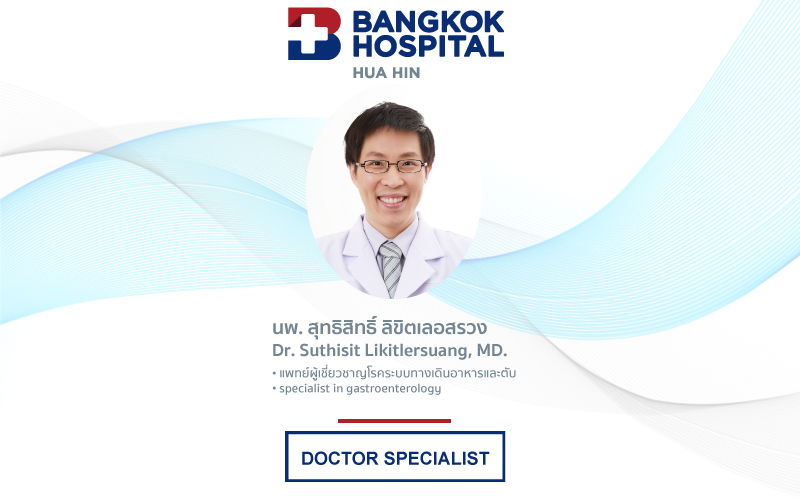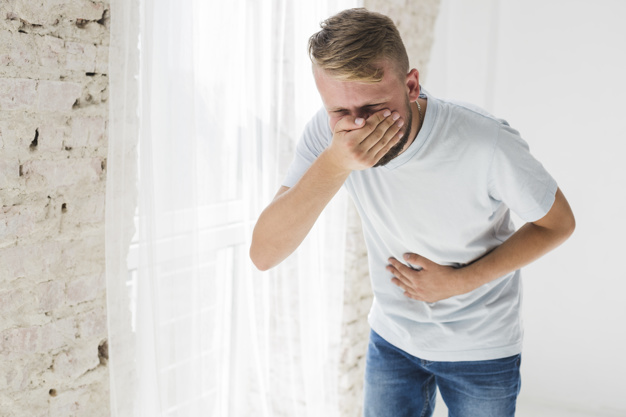“Gastric Cancer” … should not be overlooked
Gastric cancer, commonly known as stomach cancer, is a pervasive health issue that can affect anyone, often presenting with nonspecific symptoms. This ambiguity can lead to misdiagnosis, delaying crucial treatment until the disease has progressed. Globally, gastric cancer ranks among the top 10 most diagnosed cancers. It’s more frequently diagnosed in men than women, predominantly affecting individuals above 40 and 50 years old and those with a family history of gastrointestinal cancers.
 Dr. Suthisit Likitlersuang, our esteemed gastroenterologist at Bangkok Hospital Hua Hin, explains that gastric cancer has multifaceted causes. One significant risk factor is the Helicobacter pylori (H. pylori) bacterium. Research indicates that H. pylori can cause stomach inflammation, ulcers, and chronic gastritis, elevating the risk of gastric cancer over time.
Additionally, dietary and lifestyle choices can also contribute to the risk. Consuming charred, grilled, or smoked foods, smoking, excessive alcohol intake, and regularly consuming salty, pickled, or processed foods can heighten the risk. These foods often contain nitrates or nitrosamines, known carcinogens that increase gastric cancer risk.
Recognizing the symptoms of gastric cancer can be challenging due to their nonspecific nature. Patients may experience vague symptoms like upper abdominal discomfort, loss of appetite, indigestion, nausea, or bloating, which can mimic other gastrointestinal issues. As the disease progresses, symptoms can become more severe, including vomiting blood, difficulty swallowing, unexplained weight loss, fatigue, and changes in stool color.
Diagnosing gastric cancer involves several methods. Initial tests may include blood tests to detect H. pylori or the Urea Breath Test. Upper gastrointestinal endoscopy allows for a direct view of the stomach lining, enabling biopsies to confirm cancerous tissue. Advanced imaging techniques, such as CT scans, chest X-rays, bone scans, and PET/CT scans, may also be used to determine the extent of the disease.
Dr. Suthisit Likitlersuang, our esteemed gastroenterologist at Bangkok Hospital Hua Hin, explains that gastric cancer has multifaceted causes. One significant risk factor is the Helicobacter pylori (H. pylori) bacterium. Research indicates that H. pylori can cause stomach inflammation, ulcers, and chronic gastritis, elevating the risk of gastric cancer over time.
Additionally, dietary and lifestyle choices can also contribute to the risk. Consuming charred, grilled, or smoked foods, smoking, excessive alcohol intake, and regularly consuming salty, pickled, or processed foods can heighten the risk. These foods often contain nitrates or nitrosamines, known carcinogens that increase gastric cancer risk.
Recognizing the symptoms of gastric cancer can be challenging due to their nonspecific nature. Patients may experience vague symptoms like upper abdominal discomfort, loss of appetite, indigestion, nausea, or bloating, which can mimic other gastrointestinal issues. As the disease progresses, symptoms can become more severe, including vomiting blood, difficulty swallowing, unexplained weight loss, fatigue, and changes in stool color.
Diagnosing gastric cancer involves several methods. Initial tests may include blood tests to detect H. pylori or the Urea Breath Test. Upper gastrointestinal endoscopy allows for a direct view of the stomach lining, enabling biopsies to confirm cancerous tissue. Advanced imaging techniques, such as CT scans, chest X-rays, bone scans, and PET/CT scans, may also be used to determine the extent of the disease.
 Treatment options depend on the cancer’s stage and severity. Early-stage gastric cancer may be treated with surgery, either partial or total gastrectomy, combined with lymph node removal. Chemotherapy and radiation therapy may also be recommended post-surgery.
Prevention plays a crucial role in reducing gastric cancer risk. Adopting a diet rich in vegetables and fruits, avoiding processed and smoked foods, and maintaining a healthy lifestyle through regular exercise are key preventive measures. Quitting smoking, limiting alcohol consumption, and undergoing regular screenings are also vital, especially for individuals with a family history or those above 40-50 years old.
The importance of early detection: “While early detection can significantly improve outcomes, gastric cancer is often diagnosed at advanced stages. Regular health check-ups, awareness of potential symptoms, and avoiding risk factors are essential. If you’re at risk or have a family history of gastric cancer, consult a doctor for tailored screening and preventive care.” By prioritizing prevention and early detection, we can make strides in reducing the impact of gastric cancer on our community, Dr. Suthisit concludes.
Treatment options depend on the cancer’s stage and severity. Early-stage gastric cancer may be treated with surgery, either partial or total gastrectomy, combined with lymph node removal. Chemotherapy and radiation therapy may also be recommended post-surgery.
Prevention plays a crucial role in reducing gastric cancer risk. Adopting a diet rich in vegetables and fruits, avoiding processed and smoked foods, and maintaining a healthy lifestyle through regular exercise are key preventive measures. Quitting smoking, limiting alcohol consumption, and undergoing regular screenings are also vital, especially for individuals with a family history or those above 40-50 years old.
The importance of early detection: “While early detection can significantly improve outcomes, gastric cancer is often diagnosed at advanced stages. Regular health check-ups, awareness of potential symptoms, and avoiding risk factors are essential. If you’re at risk or have a family history of gastric cancer, consult a doctor for tailored screening and preventive care.” By prioritizing prevention and early detection, we can make strides in reducing the impact of gastric cancer on our community, Dr. Suthisit concludes.
 **************************************************************************
For more information and booking an appointment, please contact :
Tel. 032-616-800 Call Center, Bangkok Hospital Hua Hin
Tel: 032-616-880 (7.00 – 19.00 hrs.) Out-Patient Department, ground floor
News & Information >> Line ID : @bangkokhuahin
**************************************************************************
For more information and booking an appointment, please contact :
Tel. 032-616-800 Call Center, Bangkok Hospital Hua Hin
Tel: 032-616-880 (7.00 – 19.00 hrs.) Out-Patient Department, ground floor
News & Information >> Line ID : @bangkokhuahin
 Dr. Suthisit Likitlersuang, our esteemed gastroenterologist at Bangkok Hospital Hua Hin, explains that gastric cancer has multifaceted causes. One significant risk factor is the Helicobacter pylori (H. pylori) bacterium. Research indicates that H. pylori can cause stomach inflammation, ulcers, and chronic gastritis, elevating the risk of gastric cancer over time.
Additionally, dietary and lifestyle choices can also contribute to the risk. Consuming charred, grilled, or smoked foods, smoking, excessive alcohol intake, and regularly consuming salty, pickled, or processed foods can heighten the risk. These foods often contain nitrates or nitrosamines, known carcinogens that increase gastric cancer risk.
Recognizing the symptoms of gastric cancer can be challenging due to their nonspecific nature. Patients may experience vague symptoms like upper abdominal discomfort, loss of appetite, indigestion, nausea, or bloating, which can mimic other gastrointestinal issues. As the disease progresses, symptoms can become more severe, including vomiting blood, difficulty swallowing, unexplained weight loss, fatigue, and changes in stool color.
Diagnosing gastric cancer involves several methods. Initial tests may include blood tests to detect H. pylori or the Urea Breath Test. Upper gastrointestinal endoscopy allows for a direct view of the stomach lining, enabling biopsies to confirm cancerous tissue. Advanced imaging techniques, such as CT scans, chest X-rays, bone scans, and PET/CT scans, may also be used to determine the extent of the disease.
Dr. Suthisit Likitlersuang, our esteemed gastroenterologist at Bangkok Hospital Hua Hin, explains that gastric cancer has multifaceted causes. One significant risk factor is the Helicobacter pylori (H. pylori) bacterium. Research indicates that H. pylori can cause stomach inflammation, ulcers, and chronic gastritis, elevating the risk of gastric cancer over time.
Additionally, dietary and lifestyle choices can also contribute to the risk. Consuming charred, grilled, or smoked foods, smoking, excessive alcohol intake, and regularly consuming salty, pickled, or processed foods can heighten the risk. These foods often contain nitrates or nitrosamines, known carcinogens that increase gastric cancer risk.
Recognizing the symptoms of gastric cancer can be challenging due to their nonspecific nature. Patients may experience vague symptoms like upper abdominal discomfort, loss of appetite, indigestion, nausea, or bloating, which can mimic other gastrointestinal issues. As the disease progresses, symptoms can become more severe, including vomiting blood, difficulty swallowing, unexplained weight loss, fatigue, and changes in stool color.
Diagnosing gastric cancer involves several methods. Initial tests may include blood tests to detect H. pylori or the Urea Breath Test. Upper gastrointestinal endoscopy allows for a direct view of the stomach lining, enabling biopsies to confirm cancerous tissue. Advanced imaging techniques, such as CT scans, chest X-rays, bone scans, and PET/CT scans, may also be used to determine the extent of the disease.
 Treatment options depend on the cancer’s stage and severity. Early-stage gastric cancer may be treated with surgery, either partial or total gastrectomy, combined with lymph node removal. Chemotherapy and radiation therapy may also be recommended post-surgery.
Prevention plays a crucial role in reducing gastric cancer risk. Adopting a diet rich in vegetables and fruits, avoiding processed and smoked foods, and maintaining a healthy lifestyle through regular exercise are key preventive measures. Quitting smoking, limiting alcohol consumption, and undergoing regular screenings are also vital, especially for individuals with a family history or those above 40-50 years old.
The importance of early detection: “While early detection can significantly improve outcomes, gastric cancer is often diagnosed at advanced stages. Regular health check-ups, awareness of potential symptoms, and avoiding risk factors are essential. If you’re at risk or have a family history of gastric cancer, consult a doctor for tailored screening and preventive care.” By prioritizing prevention and early detection, we can make strides in reducing the impact of gastric cancer on our community, Dr. Suthisit concludes.
Treatment options depend on the cancer’s stage and severity. Early-stage gastric cancer may be treated with surgery, either partial or total gastrectomy, combined with lymph node removal. Chemotherapy and radiation therapy may also be recommended post-surgery.
Prevention plays a crucial role in reducing gastric cancer risk. Adopting a diet rich in vegetables and fruits, avoiding processed and smoked foods, and maintaining a healthy lifestyle through regular exercise are key preventive measures. Quitting smoking, limiting alcohol consumption, and undergoing regular screenings are also vital, especially for individuals with a family history or those above 40-50 years old.
The importance of early detection: “While early detection can significantly improve outcomes, gastric cancer is often diagnosed at advanced stages. Regular health check-ups, awareness of potential symptoms, and avoiding risk factors are essential. If you’re at risk or have a family history of gastric cancer, consult a doctor for tailored screening and preventive care.” By prioritizing prevention and early detection, we can make strides in reducing the impact of gastric cancer on our community, Dr. Suthisit concludes.
 **************************************************************************
For more information and booking an appointment, please contact :
Tel. 032-616-800 Call Center, Bangkok Hospital Hua Hin
Tel: 032-616-880 (7.00 – 19.00 hrs.) Out-Patient Department, ground floor
News & Information >> Line ID : @bangkokhuahin
**************************************************************************
For more information and booking an appointment, please contact :
Tel. 032-616-800 Call Center, Bangkok Hospital Hua Hin
Tel: 032-616-880 (7.00 – 19.00 hrs.) Out-Patient Department, ground floor
News & Information >> Line ID : @bangkokhuahin